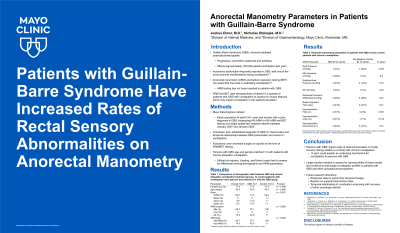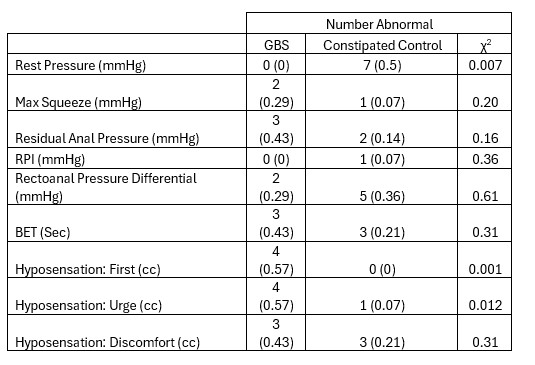Tuesday Poster Session
Category: Colon
P4539 - Anorectal Manometry Parameters in Patients With Guillain-Barre Syndrome

- JE
Joshua Elmer, MD
Mayo Clinic
Rochester, MN
Presenting Author(s)
Mayo Clinic, Rochester, MN
Introduction:
Guillain Barre Syndrome (GBS) is an immune-mediated polyradiculoneuropathy characterized by progressive symmetric weakness and areflexia. Many patients with GBS experience autonomic dysfunction, and gastrointestinal manifestations of GBS including constipation are common. Typical mechanistic testing for constipation such as anorectal manometry (ARM) in GBS patients has not been well studied. This study aimed to retrospectively review patients with GBS who underwent testing to assess for a defecatory disorders, to uncover unique pathophysiology to the mechanism of constipation in GBS as compared to a cohort of random age and gender-matched individuals undergoing ARM for constipation.
Methods:
Men and women ages 18 years and older with a prior diagnosis of GBS who received HR-ARM or HD-ARM and BET testing at a single quaternary hospital network between 1/1/2007 and 1/1/2025 and who experienced a temporal relationship between GBS presentation and constipation symptoms were included in the analysis. Patients were excluded if constipation preceded GBS presentation, in cases of prior anorectal surgery, and those with active opioid use at time of defecatory testing. ARM data in the seven identified patients with GBS were compared 1:2 against age and gender-matched controls with chronic constipation using common descriptive statistics and analysis was performed with chi-square testing.
Results:
5 female and 2 male patients with GBS were identified, with a mean patient age of 43 at time of ARM testing. The most notable difference between GBS patients and controls were that 57% of GBS patients experienced hyposensitivity on first sensation/urge threshold and 43% had discomfort above the range of normal sensation. Sensitivity abnormalities to urge threshold and discomfort threshold were only noted in one and three controls, respectively.
Discussion: In a small sample population of patients with temporal relationship between GBS and constipation onset, there were much higher rates of sensory abnormalities noted in rectal sensory testing as compared to a control group without GBS. This may suggest a mechanistic hypothesis for constipation in a considerable proportion of patients with GBS and argues for the pursuit of ARM testing in GBS patients for an objective targeted approach to constipation management.

Disclosures:
Joshua Elmer, MD, Nicholas Oblizajek, MD. P4539 - Anorectal Manometry Parameters in Patients With Guillain-Barre Syndrome, ACG 2025 Annual Scientific Meeting Abstracts. Phoenix, AZ: American College of Gastroenterology.

